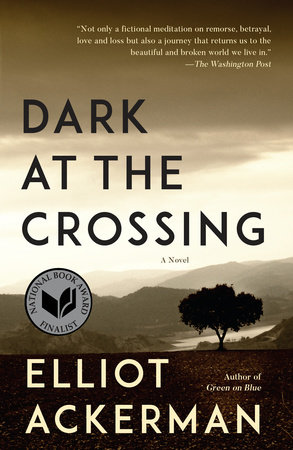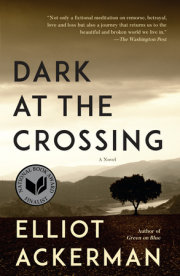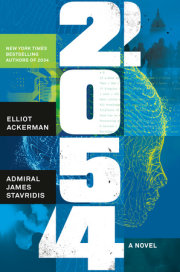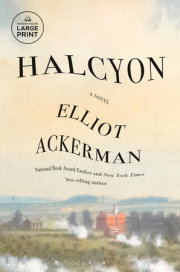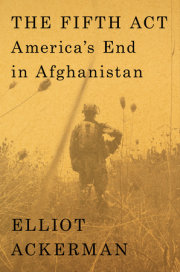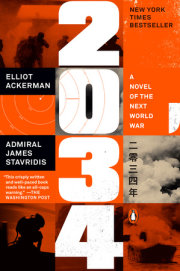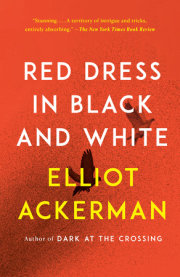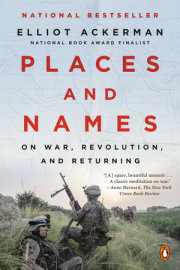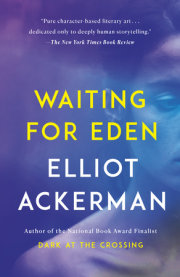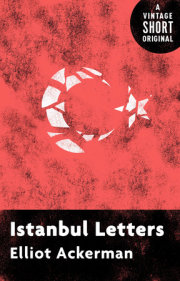I
The morning he went off to his second war, Haris Abadi spent twenty minutes in the sauna of the Tuğcan Hotel. Cleaned by his sweat, he swaddled himself in a complimentary bathrobe, went up to his room and took a long shower. Then he went back to sleep, waking naked on his bed an hour later. Downstairs for a late breakfast, he ate three buttered croissants with jam.
The concierge found Haris in the large, empty dining room, its circular tables set with fine crystal as if waiting for a party that would never come. Leaning over Haris, the concierge grasped the lapels of his suit jacket, where he wore a pinned insignia of crossed gold keys. He asked Haris something in Turkish. Haris didn’t speak Turkish and shrugged back, his mouth still full of flaky croissant.
The concierge tried Arabic: “How has your stay been?”
“Good, thank you,” said Haris.
“Business or pleasure?”
“Business,” answered Haris. There was no other reason to come to Antep, an industrial backwater along Turkey’s southern border with Syria.
The concierge looked at the stuffed hiking pack propped against the leg of Haris’s chair. “Checking out then?”
Haris reached into a deep internal pocket on the pack, fishing around for his cash. He pulled out a mixed roll of Turkish lira, American dollars and Syrian pounds. He held the wad beneath the table, counting it bill by bill. The concierge hovered above him.
“Two hundred a night, yes?” asked Haris, peeling six hundred lira off his roll.
The concierge nodded, eyeing Haris’s dollars. “You’re American?” he asked.
Haris handed over the money for three nights. “Here, six hundred.”
He felt the concierge taking a closer look at him: his pack, his desert--suede combat boots.
“I’d prefer you pay in dollars,” said the concierge.
As hard as he’d worked to become an American, Haris hated the way his new clothes and strong currency betrayed him abroad. He paid in dollars, and the concierge tucked the tight fold of twenties into his vest’s front pocket.
“Allow me to find you a cab.”
Haris nodded, then got up and went to the bathroom, leaving his heavy pack unattended in the opulent dining room. He didn’t seem to care if everything was taken from him.
It had rained the night before, and that morning the late autumn sky cleared, turning the air cold, freezing the sidewalks. Outside the Tuğcan, an old man, a Syrian, swept the slush from the hotel’s marble front step with a rolled copy of the daily paper, Milliyet. His eyes were sheathed in wrinkles and on his head he wore a keffiyeh. It was held in place by an igal, a coiled wreath, which sat on him like the crown of perpetual defeat. Hunched over, the old man worked slowly, positioning himself so someone from the hotel might notice his pains and offer a bit of charity.
The revolving door spun a turn, and the concierge and Haris stepped outside. The old man looked up at them, holding his face toward the sun. He offered a toothy, rotten grin. His eyes shifted from them to his work, clearing the last of the slush from their path. Haris reached into his pocket. His fingers felt for a coin or folded lira note. Before he could find either, the concierge flicked the toe of a polished oxford at the old man, shooing him away. The old man said nothing. He took a few steps from the Tuğcan’s marble front and wandered onto the frozen sidewalk, where he stood like a broken piece of furniture set out in the street.
The concierge reached into his vest pocket and blew a small silver whistle. A yellow taxi with the Tuğcan’s logo—-a setting or rising sun, it was difficult to tell which—-pulled in front of the hotel. Unfolding a map of Syria and southern Turkey, Haris walked to the driver’s window. The driver rubbed his thickly stubbled cheeks as Haris traced the route from Antep to the border crossing thirty miles south, in a town called Kilis.
The concierge insisted on loading Haris’s hiking pack into the taxi. He slammed the trunk closed. “I hope you’ll stay with us again.”
With no plans to return, Haris felt uncertain what to say. “Yes,” he mumbled. Reaching into his pocket, he pulled out the first coin he found—-one lira, a meager sum. He palmed it over to the concierge, who took the gratuity with the same composure a gentleman takes an insult.
Haris slammed the taxi’s yellow door, happy to be leaving the Tuğcan and Antep. The concierge headed back toward the hotel, crossing the marble step that had been cleared of slush. Appreciating this clean patch, he glanced to where the old man lingered on the frozen sidewalk. Their eyes met, and the old man straightened himself, fixing his keffiyeh, smoothing its tasseled ends over his narrow shoulders.
Haris’s taxi pulled into the street. From its window, he saw the old man ambling toward the Tuğcan’s revolving door. The concierge stood on the cleared marble step. He handed the old man Haris’s one lira for his labor. As the taxi took the last turn toward the highway, Haris glimpsed the old man’s contorted, angry expression when he tucked the coin into his pocket, the concierge having passed along Haris’s insult.
The cab followed the D850, a highway constructed as sturdily as anything Haris had seen in Michigan, where he’d brought his sister after his first war. Removing his map, Haris traced the D850 with his finger as it ran out of Antep, or Gaziantep as the map read, though Haris had yet to meet anyone who called it such.
It was a city of two names with three meanings.
Haris could recognize that Antep was a corruption of the Arabic ayn tayyib, which meant “the good spring.” After the democratic revolutions of two springs past, it augured well to return through a city with this name. A hundred years before, the Turkish parliament had appended the “Gazi” or ghazi, meaning “hero,” after the city’s citizens repulsed a French siege during the war of independence. Yet the city’s oldest name, spoken in a dead language, and in this way a hidden language, had a slightly different meaning. In Aramaic the word is ayn debo, “the spring of the wolf.”
Haris found where the D850 ran out of Antep and intersected the D400, which crossed from Turkey into Syria, passing through cities like Ar--Raqqa and Deir ez--Zor, which had become infamous after two years of civil war. But the route remained anonymous, connecting places yet being no place. When the D400 entered Iraq, it became Highway 10. But always it was the same road: black, straight, its name switching with borders while every other part of it remained unchanged. Haris continued to trace the road with his finger until it spilled into a flat brown Iraqi sprawl along the Euphrates River—-Nasiriya—-his birthplace and, before the war, his home.
Of his family, he had no single memory of them together, his mother having died in childbirth with his sister, Samia, when he was six. His first home had been on the riverbank. The high marsh grass abutting a simple compound of thick, coarse cement, his mother walking him down to the bank through the brushing grass, his father returning from whatever construction job he worked with the same cement hard on his clothes—-memory was texture. Soft grass. Hard cement.
Haris leaned his head against the cracked window. The cold glass touched the bald spot, which, only in the last few months, had spread from his crown. His reddish hair was unusually light, an uncommon but not impossible shade for an Arab, evidence of some recessive trait. Past the glass, farmers’ fields flanked the road, spanning in all directions. Clods of harvested earth littered the fields. They stank with a wet--dirt smell. In places the dead stalks of the harvest burned in the dawn, which seemed to rise from the land itself, and the farmers cleared the fields, readying them for winter and the next season’s planting.
Haris thought how fertile and lush the land seemed. To live here was to be blessed. He’d always believed that was why life in Nasiriya had been violent and poor—-but for the river the land was desert, everything scarce, scarcity breeding violence. Just across this border, in Syria, around cities like Aleppo and Azaz, the land was the same as what passed by Haris’s window—-rich, wet, harvested. These three years, violence had spread there, as surely as if the land were desert, the people failing the land and what had been given them.
The meter on the dash steadily climbed, blinking close to a hundred Turkish lira. Strewn across the soaked and smoky farm fields were the sagging tents of refugee families. Outside the tents, lost--eyed men sat on plastic chairs, watching the highway. Children played in the churned mud. They chased a dog whose ribs sucked at its sides, taunting it with sticks. When the dog got away, they taunted a child who was slower than the dog.
The rows of tents thickened as the D850 ran closer to Kilis. At the town’s limit, the refugees disappeared. The streets became clean. Curbs sprung up on the side of the road, checkered yellow and white, the paint fresh. Where many roads met, roundabouts had been built. Their centers were planted with flowers, tulips mostly. Everywhere traffic lights hung between side posts, changing in unison, swaying on their wires in an uneven wind. The war and the border were less than a kilometer away, and Haris felt there was something cruel in how Kilis thrived despite its proximity to suffering.
The cabdriver pulled up to a stoplight, for a final left turn. From the roadside, a pack of children, their clothes oily with filth, rushed the taxi. Their voices chattered wild as morning birds. The cabdriver ignored their pleas until one boy knocked a little fist against the taxi’s door. The cabdriver rolled down his window to curse the boy. Before he could, the children reached their arms inside, clamoring for some charity. The cabdriver swatted at them, shouting the only words of Arabic he seemed to know: “Airy fic! Airy fic!” But the children wouldn’t “fuck off.” They wouldn’t move. A pair now stood in front of the taxi, blocking its way.
Unlike the cabdriver, Haris understood the pleading boys. He rolled down his window and pointed to a plastic shopping bag carried by the eldest, who was no more than fourteen, just a child with an Adam’s apple, his jet--black hair slicked back with what was likely pomade but could well have been engine grease. This boy offered up the plastic sack to Haris. The others calmed, sensing Haris might buy one of the cheap knickknacks they hawked. Before they could strike a deal, the cabdriver pointed to the pair who had stepped in front of his taxi. The boy with the black hair nodded in their direction. The pair stepped out of the way.
Haris fingered through the plastic bag—-a wooden comb, fingernail clippers, a cigarette lighter.
“Five lira for anything,” announced the boy with the black hair, his mouth curling into a sly grin around his wide--spaced teeth.
Haris reached through the window, taking the lighter from the bag, which he passed back to them. “How about this?” he asked, digging a few coins from his pants pocket. A younger boy had approached Haris’s window. He was skinny, his face grained in dirt, but he had very clear gray eyes, which watched Haris from behind a pair of thick glasses, their right lens missing. Instead of passing his coins to the sly boy with the black hair, Haris reached toward this other, weaker boy.
Before Haris could pay, the light went green. The cabdriver sped through the intersection, pinning Haris to his seat. As he sat up, Haris tossed a handful of change out his window. He then glanced through the cab’s rear windshield. The boys scrambled down the road. The boy with the black hair pried their bodies apart as they wrestled for what Haris had left behind, all except for the younger boy, who, very calmly, stood on the curb and cleaned the one lens of his glasses with the dirty hem of his shirt.
The border crossing in Kilis smelled of sharp, acrid smoke. A pair of Turkish flags—-a white crescent pinching a white, five--pointed star on a red banner—-flanked what to Haris looked like a rest stop on the interstate. Just past the crossing, in the Syrian town of Azaz, explosions came—-CRUMP, CRUMP, CRUMP—-the noise like soda cans crushed underfoot. The impacts set off a few distant car alarms. Smoke towered upward, running along the horizon like black stitches, fastening earth to sky.
Haris shouldered his heavy hiking pack. He stood in the dust of the gravel parking lot. The cabdriver pulled back onto the road. It had been a few years since Haris had come near such violence. He remained motionless, transfixed by its familiar power, as if he’d just put an old name to a forgotten face.
Refugees from the morning’s fighting crowded the roadside. Some sat straddling their cheap, flimsy suitcases. Others squatted in the dirt with nothing. Few spoke. Those who did whispered. The crowd’s attention held on Azaz.
Haris checked his phone for an email from Saladin1984, his contact and fixer in the Northern Storm, a supposedly good brigade of the Free Syrian Army. There were no messages. It was Saladin1984 who’d recruited him to the cause, forwarding along a steady stream of treatises, manifestos and videos, each with an array of political demands that at times Haris found dizzying despite his growing commitment to these ideas. Some materials called for the establishment of a free and democratic Syria, others the removal of President Bashar al--Assad, and many a combination of the two. Haris now composed Saladin1984 a message, explaining that he’d arrived and was ready to cross the border. As he finished, another CRUMP came, then more smoke, followed by the manic pop, pop, pop of rifle fire. A collective sigh went up from those stuck along the border, as if in a crowded airport terminal a final flight’s cancellation had just been announced. A few of the refugees lay down on the cold earth, as though they’d chosen to take a nap. Others wandered aimlessly along the road toward Kilis. In the parking lot’s corner, some pressed into a small café run out of an abandoned shipping container, where a squat Syrian man with a push--broom mustache served bitter tea in curved glass cups.
You came to fight, Haris told himself, looking at the distant smoke blooming from Azaz. They’re fighting right there. You’ve fought before—- No, he reminded himself—- You’ve been around fighting before. There’s a big difference. So are you going to do what you came to do?
Haris tightened down the straps on his hiking pack. He plodded toward the Plexiglas guard booth at the border crossing, feeling the refugees’ puzzled looks on him—-it was absurd for anyone to walk in the direction they’d just come from. These are the ones who abandoned their country, thought Haris. The Syrians on the other side will be different. Then he remembered how his father had abandoned him and Samia to a chorus of aunts and uncles after their mother died, disappearing into his work, then disappearing altogether, only for Haris to mimic his father—-or so he feared—-by abandoning his own country to resettle in America with his sister.
Inside the guard booth, two Turkish gendarmes watched television. They sat side by side, reclined in their cheap leather office chairs, smoking Gauloises and laughing at some show. Haris knocked gently on the window. They didn’t notice him. He knocked harder, pounding the glass. The gendarmes swung around. The pair were nearly indistinguishable. Both were young, but just old enough so a band of fat rimmed their stomachs. Smeared across their cheeks was stubble. It’d likely grown over their two--to-three--day shift. It appeared as though they lived in the booth.
Haris pressed his U.S. passport against the glass.
The pair slowly stood. Each grabbed a blue tunic from a coat-rack in the corner, buttoning its front. The first gendarme, who was a head taller than the other, came to the window. He keyed an intercom, speaking quickly in Turkish.
Not understanding, Haris said nothing.
The tall gendarme slumped his shoulders and sighed. “Yok English.”
“Arabe?” asked Haris.
The shorter of the two pushed past his friend. “Shwe, shwe,” he said, examining Haris. “The border is closed,” he added in broken Arabic.
“For how long?”
The shorter gendarme gazed toward Azaz, where a phalanx of smoke still stabbed at the horizon. “Long time.”
Haris stepped away from the glass.
Saladin1984 had assured him that crossing the border would be easy, that the Turks were no friends of Bashar al--Assad, that they welcomed foreigners who wanted to fight against the Syrian regime. Haris checked his phone, no new messages.
He tapped on the glass again. The taller gendarme nudged the shorter one, who stood heavily and approached the intercom. “What else?” he asked.
“I’m not just American,” said Haris.
“I see that,” said the gendarme. “You speak very good Arabic.”
“I’m from Iraq,” added Haris. “I only recently became an American.”
The gendarme smiled.
Haris felt a quick surge of hope in his chest, like a perfect knot cinched tight.
“You managed to leave Iraq and get all the way to America?” asked the gendarme.
Haris nodded.
“Arriving there, you managed to get citizenship for yourself?”
Again Haris nodded.
“And now you want to cross into Syria?”
Haris said nothing. He looked out toward Azaz.
The short gendarme glanced at his partner, who sat in front of the television, entranced by his program. His eyes returned to Haris’s. “You’ve come here to cross the border and die with them,” he said. The gendarme’s smile from before, the one Haris had thought was sympathy, dissolved. It hadn’t been sympathy. It’d been pity. “You’re a damn fool, and I won’t help one fool die with other fools. The border is closed.”
As the gendarme went back to his seat, his friend, who hadn’t been listening, began to laugh violently, slapping his knee and explaining the punch line to some joke on the television. A smile returned to the short gendarme’s face, and soon he was laughing too.
Copyright © 2017 by Elliot Ackerman. All rights reserved. No part of this excerpt may be reproduced or reprinted without permission in writing from the publisher.

